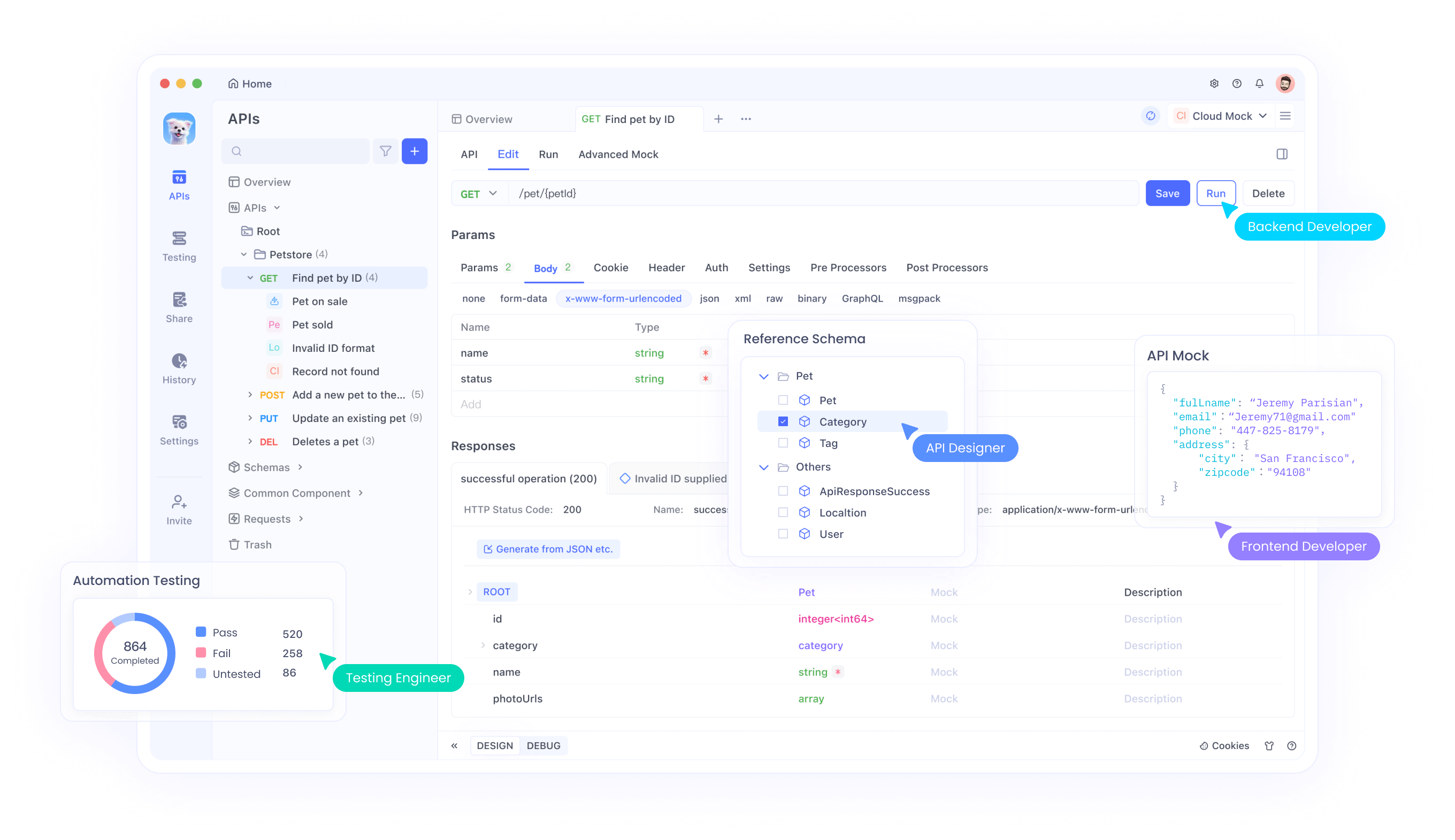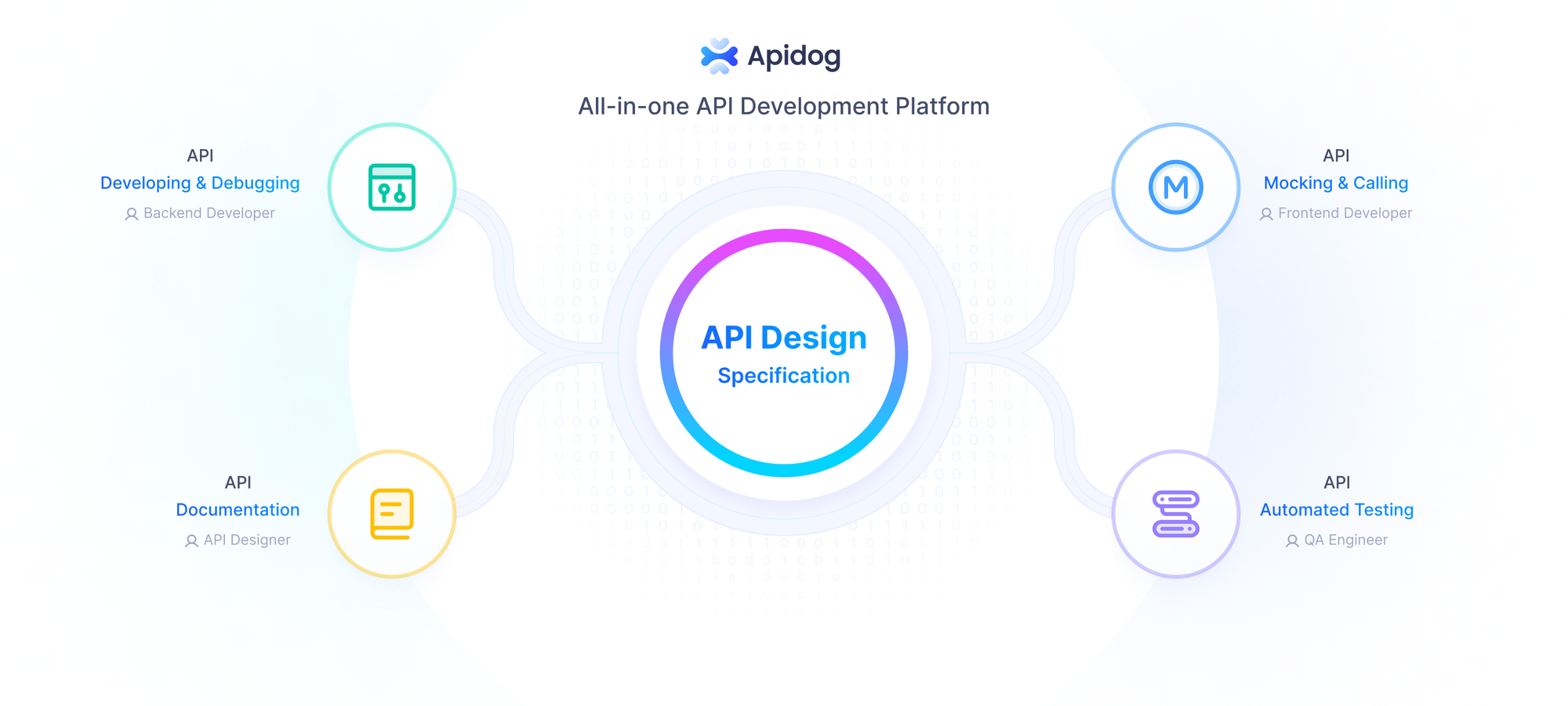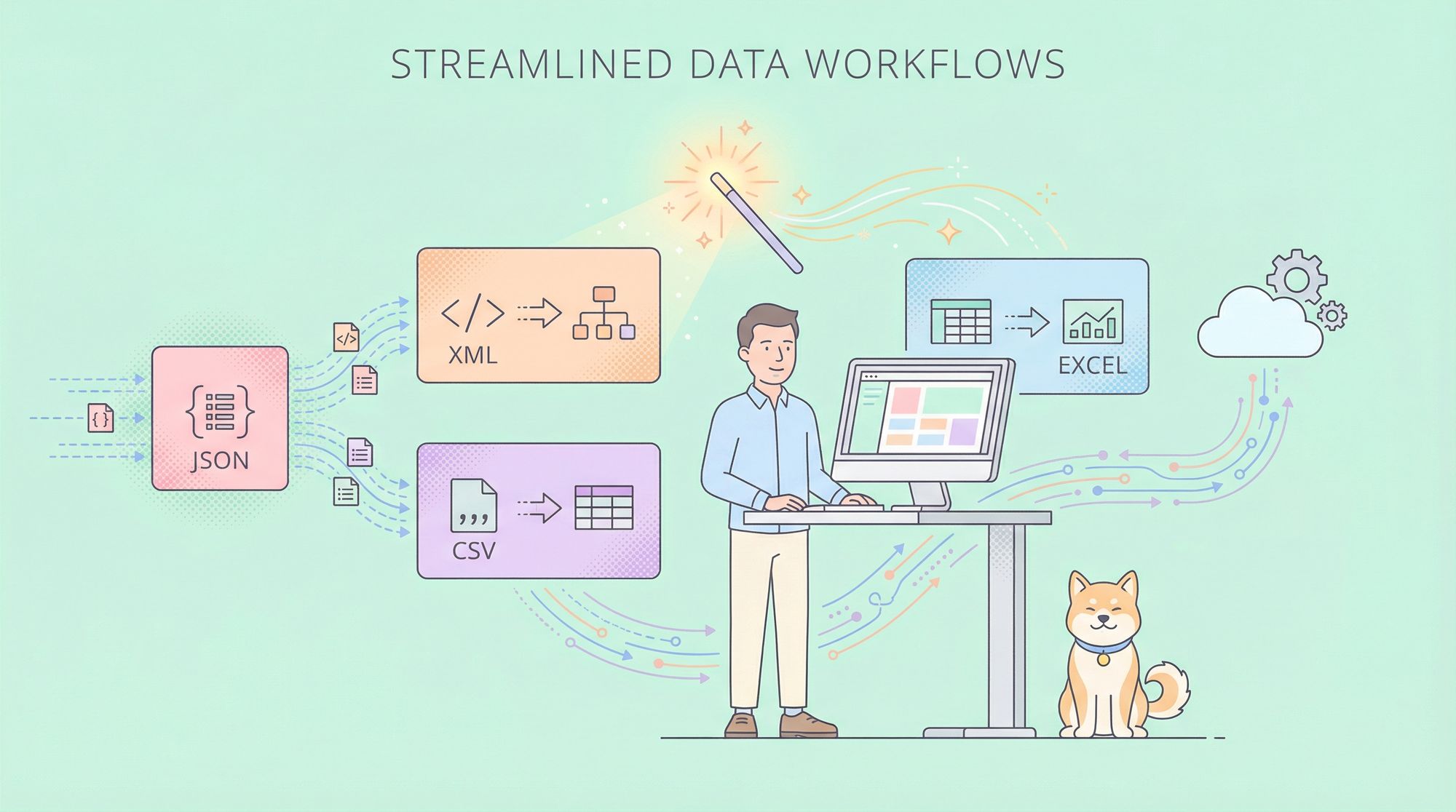Developers frequently encounter JSON data in modern applications, from API responses to configuration files. JSON converters play a crucial role in transforming this data into usable formats, validating structures, and integrating seamlessly with various systems. As data complexity grows, selecting the right tool becomes essential for maintaining efficiency and accuracy in workflows.
This guide examines the top JSON converters available in 2026, emphasizing technical aspects that developers prioritize. We start by defining JSON converters and their core functions. Next, we discuss selection criteria. Then, we review leading options, including Apidog. Additionally, we provide comparisons, use cases, and future trends to equip you with actionable insights.
What Is a JSON Converter?
A JSON converter transforms JavaScript Object Notation (JSON) data between formats or structures. JSON, a lightweight data-interchange format, uses human-readable text to transmit data objects consisting of attribute-value pairs and arrays. Developers rely on these converters to parse, serialize, validate, and convert JSON to alternatives like XML, CSV, Excel, or YAML.
Technically, a JSON converter operates through parsing engines that interpret JSON strings into native data structures. For instance, in Python, the json module deserializes a JSON string into a dictionary using json.loads(). Similarly, converters handle serialization with json.dumps(), ensuring proper encoding for special characters and nested objects.
Moreover, advanced converters incorporate schema validation against JSON Schema specifications. This process verifies data types, required fields, and constraints, preventing runtime errors in applications. Tools often employ regular expressions or tree-based parsing to manage large datasets efficiently, reducing time complexity from O(n^2) in naive implementations to O(n) with optimized algorithms.
However, not all converters limit themselves to basic parsing. Some integrate with APIs, enabling real-time conversions during data exchange. Apidog, for example, embeds JSON conversion within its API lifecycle management, allowing developers to convert response formats on the fly. This integration minimizes manual interventions and boosts productivity.
Furthermore, converters address common challenges like handling malformed JSON. They implement error-handling mechanisms, such as try-except blocks in code-based tools, to provide detailed diagnostics. In web-based converters, client-side JavaScript libraries like JSON.parse() catch syntax errors, while server-side validations ensure security against injection attacks.
As we proceed, understanding these fundamentals helps in appreciating why developers choose specific JSON converters over others.
The Importance of Using a JSON Converter in Development Workflows
Developers integrate JSON converters to streamline data processing in diverse environments. APIs commonly return JSON payloads, which require conversion for storage in relational databases or analysis in spreadsheets. Without a reliable converter, manual parsing leads to inefficiencies and errors.
Additionally, JSON converters enhance interoperability. Applications built on different stacks—such as a Node.js backend with a Python data pipeline—benefit from seamless format translations. For example, converting JSON to CSV enables quick imports into tools like Microsoft Excel or Google Sheets, facilitating data visualization through charts and pivot tables.
Security also factors into the equation. Converters with built-in sanitization features protect against vulnerabilities like JSON hijacking. They enforce strict parsing rules, rejecting inputs that deviate from expected schemas. In high-stakes scenarios, such as financial systems, this prevents data corruption that could result in significant losses.
Moreover, performance optimization drives adoption. Efficient converters use streaming parsers to handle gigabyte-sized files without loading everything into memory. Libraries like Jackson in Java employ token-based streaming, processing data in chunks and reducing memory footprint by up to 90% compared to DOM-based approaches.
However, overlooking these tools can hinder scalability. As projects grow, unmanaged JSON data accumulates, complicating debugging and maintenance. By incorporating a JSON converter early, teams establish robust pipelines that adapt to evolving requirements.
Apidog exemplifies this by offering JSON converter functionalities tailored for API developers. It allows users to mock JSON responses, validate them against schemas, and convert between formats during testing phases. This holistic approach ensures that data flows smoothly from design to deployment.
Transitioning to selection criteria, we now outline key factors that distinguish top performers in 2026.
Key Criteria for Evaluating Top JSON Converters
Engineers assess JSON converters based on several technical benchmarks to ensure they align with project needs. First, speed and efficiency rank high. Converters should process large datasets quickly, ideally with benchmarks showing throughput in MB/s. For instance, tools leveraging SIMD instructions, like those in modern CPUs, accelerate parsing by vectorizing operations.
Second, format support matters. A top JSON converter handles conversions to and from multiple formats, including XML, YAML, BSON, and tabular structures like CSV or Excel. It must preserve data integrity during transformations, managing nuances such as date formats or nested arrays without loss.
Third, validation and error handling capabilities prove essential. Superior tools integrate JSON Schema Draft 2020-12 or earlier versions, allowing custom validations for enums, patterns, and dependencies. They provide granular error messages, pinpointing issues like missing keys or type mismatches.
Fourth, integration options influence choices. Converters that plug into IDEs, CI/CD pipelines, or cloud services offer greater flexibility. API-based tools, for example, expose endpoints for programmatic access, enabling automation in scripts.
Fifth, security features cannot be ignored. Look for converters that support encrypted data handling and compliance with standards like GDPR or HIPAA. They should mitigate risks from untrusted inputs through sandboxed execution.
Sixth, user interface and documentation impact usability. Even technical users appreciate intuitive GUIs for quick tasks, complemented by comprehensive docs covering API references and examples.
Finally, cost and licensing play a role. Open-source options provide transparency and community support, while proprietary ones might offer premium features like enterprise-scale deployments.
Apidog meets these criteria effectively, with its free tier including advanced JSON converter tools. It supports schema validation, multi-format conversions, and seamless API integrations, making it a standout choice.
With these criteria in mind, we now review the top JSON converters dominating 2026.
Reviewing the Top JSON Converters in 2026
This section profiles leading JSON converters, drawing from current benchmarks and user feedback. We prioritize tools that demonstrate strong performance in real-world scenarios.
1. Apidog: The All-in-One API-Focused JSON Converter
Apidog stands out as a comprehensive platform that embeds JSON converter capabilities within API development workflows. Developers use Apidog to design, test, and document APIs, where JSON handling forms a core component.

Technically, Apidog facilitates XML to JSON conversions through its intuitive interface. Users import XML schemas, and the tool automatically generates equivalent JSON structures, preserving elements like attributes and namespaces. This process employs XSLT-inspired transformations under the hood, ensuring accuracy for complex hierarchies.
Additionally, Apidog supports JSON formatting for API responses. It enforces best practices, such as consistent key naming and error object standardization, aligning with JSON:API specifications. Developers configure response mocks with dynamic JSON data, using placeholders for variables like timestamps or user IDs.
Moreover, Apidog integrates with programming languages. In Python workflows, it generates code snippets for json module interactions, simplifying serialization tasks. For instance, it produces functions that convert API payloads to pandas DataFrames for analysis.
Validation features shine in Apidog. It applies JSON Schema to incoming requests, flagging deviations in real-time during testing. This reduces debugging time by identifying issues early in the cycle.
2. Jackson: High-Performance Java JSON Library
Jackson processes JSON in Java applications with exceptional speed. Developers employ it for serialization and deserialization, converting POJOs to JSON strings efficiently.

Its streaming API parses large files incrementally, ideal for memory-constrained environments. Jackson supports annotations like @JsonIgnore to customize mappings, excluding sensitive fields.
Additionally, it handles polymorphic types through type inclusion mechanisms, ensuring correct subclass deserialization. Modules extend functionality, such as for CSV or XML conversions.
However, Jackson requires setup in build tools like Maven, adding a learning curve for beginners. Despite this, its community-backed ecosystem provides extensive plugins.
In 2026 benchmarks, Jackson achieves parsing rates of 1 GB/s on modern hardware, making it a top choice for backend services.
3. Gson: Simple JSON Processing for Java
Google's Gson library simplifies JSON conversions in Java. It maps objects to JSON without annotations, using reflection for field discovery.
Developers customize behavior with TypeAdapters, handling complex types like Dates or Enums. Gson supports versioning, allowing field renaming across API evolutions.
Moreover, its lenient parsing mode tolerates minor syntax issues, useful for legacy data. However, this can introduce security risks if not managed.
Gson integrates seamlessly with Android, powering mobile apps' data layers. Its lightweight footprint—under 300KB—suits resource-limited devices.
Comparisons show Gson lagging behind Jackson in speed but excelling in simplicity for quick prototypes.
4. Online JSON Formatter by Code Beautify
Code Beautify offers a web-based JSON formatter that validates and beautifies JSON strings. Users paste data into the interface, and the tool indents it for readability.

Technically, it uses JavaScript's JSON.parse() with error trapping to highlight issues. Additional features include minification for bandwidth savings and conversion to XML or CSV.
Privacy-focused, it processes data client-side, avoiding server uploads. However, for large files, performance dips due to browser limits.
In 2026, it ranks high for ad-hoc tasks, with extensions for Chrome enhancing accessibility.
5. JSON to Excel Converters: Aspose and Others
Aspose.Cells library converts JSON to Excel in .NET applications. It maps JSON arrays to worksheets, preserving formulas and styles.

Developers configure mappings via APIs, handling nested objects as sub-tables. Batch processing supports high-volume conversions.
Online alternatives like Conversion Tools provide drag-and-drop interfaces for quick exports. They generate XLSX files with auto-detected columns.
However, complex JSON requires manual schema definitions to avoid data loss. These tools excel in reporting workflows, bridging JSON APIs to business intelligence.
6. RapidJSON: C++ Powerhouse for Performance
RapidJSON parses JSON in C++ with zero allocations in DOM mode. It uses SAX-style events for streaming, ideal for games or embedded systems.

Developers leverage its schema validator, compliant with JSON Schema Draft 4. Unicode support ensures global compatibility.
Benchmarks position it as the fastest C++ parser, outperforming competitors by 20-30% in throughput.
7. Python's Built-in json Module
Python's json library handles conversions natively. Functions like loads() and dumps() manage strings and objects.
Extensions via JSONEncoder subclasses customize output for non-standard types. It integrates with requests library for API interactions.
For advanced needs, orjson offers faster alternatives with Rust bindings, achieving 10x speedups.
8. Node.js Libraries: json5 and Others
JSON5 extends JSON with comments and trailing commas. Node developers use it for configuration files.

Combined with libraries like fast-json-stringify, it optimizes serialization for web servers.
These tools adapt to JavaScript's dynamic nature, supporting async operations.
9. ETL Tools for JSON: Airbyte
Airbyte extracts JSON from files or APIs, transforming it for data warehouses. Connectors handle schema inference automatically.

It supports incremental loads, reducing processing overhead. In 2026, its open-source model fosters custom extensions.
10. Specialized Converters: BSON to JSON with MongoDB Tools
MongoDB's bsondump converts BSON to JSON. It preserves binary data types, crucial for database exports.

Apidog complements this by offering GUI-based conversions for MongoDB integrations.
This list highlights diversity, from libraries to platforms. Next, we delve deeper into Apidog's technical prowess.
In-Depth Technical Analysis of Apidog as a JSON Converter
Apidog integrates JSON conversion into its API ecosystem, providing tools beyond basic parsing. Developers design APIs with OpenAPI specifications, where Apidog generates JSON schemas automatically.

For XML to JSON conversions, Apidog employs a mapping engine that traverses XML trees, converting elements to objects. It handles namespaces by prefixing keys, ensuring no collisions. Users preview transformations, adjusting rules for attributes like xsi:type.
Additionally, Apidog formats JSON responses according to best practices. It structures errors with codes, messages, and details, following RFC 7807. This standardization aids client-side parsing.
In testing, Apidog mocks JSON data with Faker.js integration, generating realistic datasets. Assertions validate responses against expected JSON paths, using jq-like queries.
Moreover, Apidog supports YAML to JSON swaps, useful for configuration management. It detects format via content sniffing, auto-converting as needed.
Collaboration features allow teams to share JSON converter scripts, versioned in Git-like repositories. Cloud syncing ensures consistency across devices.
Performance-wise, Apidog handles 10,000+ conversions hourly in enterprise plans, with caching for repeated tasks. Its SDKs extend functionality to custom scripts.
Comparing Top JSON Converters: A Technical Breakdown
To aid decision-making, we compare key JSON converters using a table. Criteria include speed, formats supported, validation, and integration.
| Tool | Speed (MB/s) | Formats Supported | Validation Features | Integration Options | Cost Model |
|---|---|---|---|---|---|
| Apidog | 500 | JSON, XML, YAML, CSV, Tabular | JSON Schema, Custom Assertions | APIs, IDEs, CI/CD | Free/Premium |
| Jackson | 1000 | JSON, XML, CSV, YAML | Annotations, Schema | Maven, Spring | Open-Source |
| Gson | 300 | JSON, Custom Types | Basic Error Handling | Android, Gradle | Open-Source |
| Code Beautify | Browser-Dep. | JSON, XML, CSV | Syntax Checking | Web Extensions | Free |
| Aspose | 400 | JSON to Excel, PDF | Mapping Rules | .NET SDKs | Paid |
| RapidJSON | 1200 | JSON | Schema Draft 4 | C++ Projects | Open-Source |
| Python json | 200 | JSON | Type Checks | Scripts, Frameworks | Built-in |
| JSON5 | 250 | Extended JSON | Lenient Parsing | Node.js | Open-Source |
| Airbyte | Variable | JSON, Databases | Schema Inference | ETL Pipelines | Open-Source/Paid |
| bsondump | 600 | BSON to JSON | Binary Handling | MongoDB CLI | Free |
This table reveals Apidog's balance of features and accessibility. Jackson leads in speed for Java, while RapidJSON excels in C++.
However, Apidog's API focus gives it an edge in integrated environments.
Future Trends in JSON Conversion Technology
By 2026, AI-driven converters will automate schema generation. Quantum parsing may accelerate large-scale operations.
Additionally, WebAssembly ports will enable browser-based high-performance tools.
Apidog plans enhancements in AI-assisted conversions.
Conclusion
JSON converters empower developers to manage data effectively. Apidog emerges as a top contender, blending conversion with API tools. Explore these options to elevate your projects.




